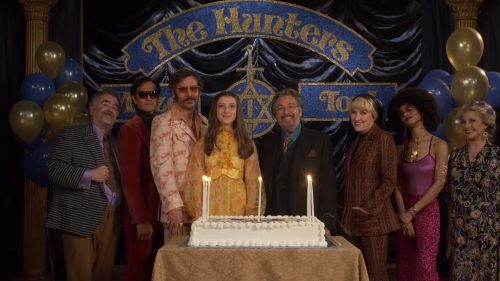ONE CUT OF THE DEAD, Prime Video Direct, Internet Piracy And You
If you follow this site or pay attention to Fantastic Fest, there’s a good chance you’ve now heard of the Japanese film One Cut of the Dead. It’s a uniquely touching film that won the Audience Award at this year's Fantastic Fest that had a successful theatrical run in Japan from late 2017 to summer 2018. It was also enough of a favorite among the BMD staff that when it suddenly showed up on Amazon Prime over the holidays, it brought much excitement to those who were dying to see it again.
However, it started to become apparent that it was not part of a real release. It is significant for any film that’s played at Fantastic Fest to sell after the fest, and as the head of Fantastic Fest’s industry office, I hadn’t heard of a US sale. That raised a red flag with me, but it doesn’t immediately mean something rotten is afoot because the US market for niche foreign language titles has shrunk considerably since IFC and Magnolia were pushing a lot of foreign films through their VOD model. Plus, license holders can and do license content directly to streaming platforms rather than wait for a US deal. What clinched it was when several folks with connections to the licensor holder, Third Window Films, suggested it was a pirated copy. Soon after, Third Window made a public statement that it was an illegal release and asked everyone to stop pushing people to it.
How did an illegal copy of a popular film (in certain circles) get uploaded to Amazon Prime? Was that bad? What does this all mean? Let’s talk about these answers from my perspective. I say my perspective because Third Window Films, a tiny UK distributor that specializes in niche Japanese films, stated that the leak would deal significant harm to both their UK release and - since they have worldwide rights - any potential sale to other territories, including the US. I'm not saying we shouldn’t take them at their word. I’m sharing my opinion as someone who has worked as a buyer and as a distributor. Their reality is their reality. Our friends over at Film School Rejects also published a take yesterday that includes a conversation with XYZ partner and Head of Acquisitions and Productions Todd Brown who reiterated the position that this leak can only damage the film’s worldwide exploitation. There’s no one who is better tied into the international marketplace than Todd Brown, so his opinion on this matter should carry a lot of weight.
I’m going to give a contrary opinion.
Let’s talk about how it happened, since this caused some surprise. We’re now in a world where digital distribution, especially subscription-based distribution, is driving the engine. One benefit from this is that it has never been easier to distribute films digitally. Platforms like Amazon Prime Direct, YouTube and Vimeo only need a digital file (and a closed-captioned file if it doesn’t have subtitles burned in) to stream a film. With Amazon Prime Direct, you do need to provide a bank account and some tax information as they will pay you per stream, so it’s not as simple as YouTube or Vimeo. It is probably worth clarifying that while you can’t tell the difference from a consumer standpoint between movies that are licensed directly for Amazon Prime or titles that are added to the service through Amazon Prime Video Direct, there is a difference in that films licensed for Prime get money upfront, while movies added to Prime Video Direct only get paid for each time someone streams the film. In this case, the pirated copy was uploaded using Prime Video Direct, and since they provided a bank account and some tax info, there is a paper trail on who did it.
This also happens a lot, especially on YouTube, as copyrighted material is uploaded every day, and as I’ve demonstrated, it's not that hard for anyone to do it. Since there’s SO MUCH CONTENT on all these platforms, there is no way for the platforms themselves to police piracy. It would take an army of people several months to review every piece of content that is on these services on a day-by-day basis. That’s not possible. Content owners must remove the content themselves. Since it's rather frequent, the platforms have made it extremely easy for content holders to request their copyrighted material be taken down by filling out a DMCA (Digital Millennium Copyright Act) takedown notice. You basically swear under penalty of perjury that you are the content owner and the content in question is illegal. It takes about one minute to fill out and a few hours for the content to be removed. As a distributor, I spend a few hours each week searching these sites for all the Drafthouse Films library and taking down the illegal copies. You can also hire companies to do this for you.
Was this bad? This is a more complicated answer than one might think and will lead into a larger opinion and conversation about piracy in general. First, all piracy is bad in the sense that you are losing control over your content. The content holder should always control all aspects of the release and exploitation so they can maximize its value. Piracy for Asian content is also more of a problem because piracy is even more prevalent in that part of the world. In fact, the biggest US distributor of Asian content, WellGo, has decided to always try to release their Asian content around windows set by the Asians distributors. This is a less than ideal way of distributing content as you would always prefer your territory goes first and that you can dictate when that happens. But for them, they are not the primary revenue for these titles, and they have built an effective model to either go day-and-date with the first territory or they have enough means to make the title work in a different time. But once the movie is released in Asia, they are worried about how piracy will hurt their release.
However, piracy as an effect on the exploitation of content is a lot more complicated from a philosophical standpoint. There’s a more nuanced way of looking at who is pirating content and how that affects a film’s exploitation. Let’s consider for a second that the most pirated content is frequently the highest demand content on any platform. The most recent season of Game of Thrones was pirated more than a billion times in 2017 but it still averaged more than 30 million viewers an episode. If you have content that is being pirated a significant amount, you also have content that is being legally transacted a significant amount. I know what you’re thinking. All that piracy is still costing content transactions and viewers. You’re right, it is. However, one illegal view does not equate to one lost legal view. Why? Well, let's also consider who is doing the pirating.
There are two kinds of individuals who pirate content. First, the person who will never legally transact on the content. Second is the person who will both pirate and legally transact content. It’s the folks in the second group that contribute to lost revenue from piracy, as the first group was never going to be your customer in the first place. What is interesting about the second group is, as referenced in this paper here and also this paper here, they are high consumers of content both legally and illegally, meaning the people who pirate the most movies also purchase the most movies. Since we also know that piracy can raise awareness about films the same way festivals and other word-of-mouth screenings raise awareness, the people pirating movies are also telling others about them, and that can lead to additional legal transactions.
(Quick break to point out this excellent piece in Filmmaker by our friend Matt Lynch on piracy as an archival institution which is an additional layer to this nuanced view of piracy.)
To reiterate, this is not an advocacy of piracy. It’s a perspective that doesn’t frame piracy as an absolute, and if we apply this view to what happened this past weekend with One Cut of the Dead, let’s consider how much additional awareness was raised with the film’s leak. Yes, we want these transactions to lead back to the content owner’s bank account, but all the articles and all the social messaging from people who had seen the film and loved it were done in service of driving awareness. And drive awareness they did.
Did the leak hurt the film’s sales chances? I personally don’t believe so. The film has been finished and available for sale since 2017 and has already been released in Asia where, as I mentioned above, US distributors already know that once the film has been released (including home entertainment), it's already going to be frequently pirated. Also, the film had not secured US distribution despite playing at several high-profile genre fests and winning the audience award at Fantastic Fest with almost all the leading US distributors of foreign genre content in attendance. I’d also like to suggest, as both a former retail buyer and current distributor, these leaks are usually not the fault of the licensor holder, and we know the content can quickly come down, as it did in this case. Potential buyers of content and gatekeepers to digital, home entertainment platforms know it's not part of the official release, and it's unlikely they will hold it against the content owner especially with a film that has such a passionate following. That demonstrates significant demand.
What happened this weekend with One Cut of the Dead was unfortunate. Third Window is dealing with the real-world repercussions of the film's leak. It’s a special film and hopefully the aftermath is more tempered, as I have suggested. My goal here was to explain how this happened and what it could mean in a larger view of piracy and how it affects distribution.



